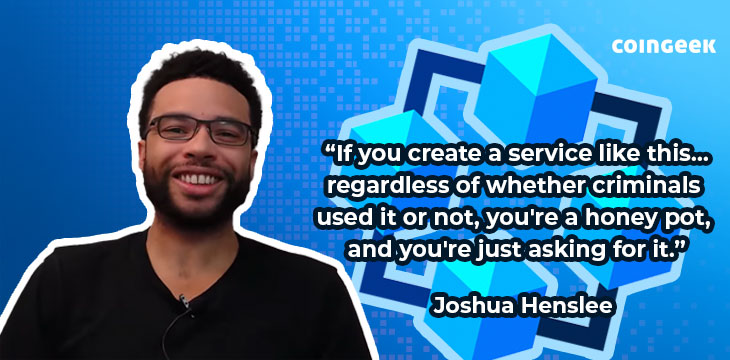|
Getting your Trinity Audio player ready...
|
Last week, Ethereum-based coin mixing service Tornado Cash was sanctioned by the U.S. Department of Treasury, and its lead developer was arrested in Europe. Bitcoin developer Joshua Henslee released a new video to share his thoughts on what’s going on.
A recap of the current situation
Henslee begins by briefly recapping the current situation: last August 8, the U.S. Department of Treasury sanctioned Tornado Cash, a coin mixer protocol on Ethereum. Shortly thereafter, the project’s GitHub was taken down, and its lead developer was arrested.
“This is the latest move here, and it’s quite a big one,” Henslee says, reminding us that he’s been warning that the clampdown was coming ever since the SEC started investigating various exchanges such as Coinbase (NASDAQ: COIN).
In Henslee’s view, the fact that coin prices haven’t responded yet, and those involved in Ethereum and the wider digital currency industry have doubled down, claiming that privacy is a human right, is a sign of denial.
“This is just the first one to drop,” he predicts.
“If you create a service like this…regardless of whether criminals used it or not, you’re a honey pot, and you’re just asking for it,” Henslee says. He points out that the ‘decentralized’ mantra doesn’t get you very far in the real world when the law comes knocking, and it’s time for those hiding behind that to wake up.
There’s no such thing as decentralized finance
Henslee reiterates that many people are in denial about what’s happening. “They’re not accepting that this is the way it’s going to be,” he says.
Furthermore, he says there’s no such thing as decentralized finance (DeFi) and that it’s just a buzzword for people to try and bypass certain regulations in an attempt to make more money. “It’s not about trying to decentralize finance,” he says, pointing out that some of it could actually bring benefits to third-world countries if the fees weren’t so high.
The problem with anonymity and account-based blockchains
One of the problems with anonymity, Henslee points out, is that you can’t prove who did or didn’t use a service. He rightly says that, even if North Korea didn’t use Tornado Cash, anonymity makes it impossible to prove, either way. Meaning any service that operates this way is a sitting duck for a takedown.
Speaking about the celebrities who were ‘tainted’ by a random Tornado Cash user sending them small amounts of ETH after the sanctions came down, Henslee points out that this is one of the flaws of Ethereum’s account-based system.
“There’s a reason Satoshi designed Bitcoin the way he did (UTXOs),” he says. “It’s because when coins interact with something like this, only a small subset of them are tainted, whereas, in an account-based system, everything is tainted,” he adds—noting that this is what allows authorities to blacklist entire wallets and accounts with ease.
The fact that ETH is still $1,900 (at the time the video was published) in the face of this “cold slap from reality” makes Henslee even more certain that people are in denial.
This is not a privacy issue
Delving deeper into how this isn’t a privacy issue, as many claims, Henslee points out that when someone interacts with a DeFi pool, a human is doing it. And that means someone is liable and accountable for that transaction. Henslee tried to remain unbiased and has said many times that he believes the same problems could occur for BSV pools if they get big enough.
Driving the point home that it’s going to be easy for governments worldwide to take down more services like Tornado Cash, Henslee again blames Ethereum. He says if it was possible to split your money across many accounts, it would be more difficult, but because of Ethereum’s high fees, most people can’t or don’t do that, so it’s easy to track, trace, and blacklist wallets. He wonders how people think they will be able to challenge powerful governments on this stuff. He likens it to trying to fight Mike Tyson without training.
That said, Henslee empathizes with people who have put their lives into promoting this sort of ‘decentralized’ vision, saying that it’s going to be incredibly difficult for them to accept what’s coming. Nonetheless, and however difficult it may be, he thinks many of these people will get rug pulled and be left ruined and disillusioned.
Watch: The BSV Global Blockchain Convention panel, Build on Blockchain: Common Challenges & Tools to Make it Easier
https://www.youtube.com/watch?v=1r93djtg5iQ&feature=youtu.be

 02-24-2026
02-24-2026 




